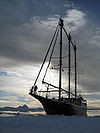
Sedna IV (vessel)
Encyclopedia

Schooner
A schooner is a type of sailing vessel characterized by the use of fore-and-aft sails on two or more masts with the forward mast being no taller than the rear masts....
which has been used for scientific expeditions and the filming of documentaries.
Built by Abeking & Rasmussen in Germany in 1957 as a fishing trawler, refitted as a sailing vessel in 1992, she was equipped with a film studio in 2001 when a Canadian film crew acquired her. The ship was previously named Saint Kilda. Sedna IV is fitted out with a cutting room and an equipment room containing high-definition filmmaking apparatus. The crew can use the onboard high-precision scientific equipment to gather, compile and analyze data to fulfill the expedition's scientific research program. The schooner is also connected to the internet via satellite, enabling land-based researchers to become virtual mariners.
The schooner has a 78,000-litre diesel reserve giving her a range of 10000 nautical miles (18,520 km). She is also equipped with 960 square metres of sailcloth.
27.04.1957: launched at Abeking & Rasmussen, Lemwerder, Germany, NB 5169 | 07.06.1957: delivered as combined motorlogger (herring drifter and sidefishing trawler), 323.33 GRT 147.84 NRT, 41.39 x 7.94 x 3.62 m, engine: Deutz SBV6 M545 Diesel 4s6c 600hp, Bielefeld BV 106, callsign DLDQ, to Bremen-Vegesacker Fischerei-Gesellschaft, Vegesack, Germany
08.07.1964: sailed into Lerwick, sailed out the next day | 05.05.1966: owners restyled to Bremen-Vegesacker Fischerei-Gesellschaft mbH, Bremen-Vegesack
08.1969: ownership moved to Norddeutsche Hochseefischerei Bremerhaven, fishing off West Africa, under leasing arrangement to Ghana, but obviously only laid up there
12.1970: laid up in Tema, Ghana, inspected by buyers and Bernhard Blanke from owners | 09.02.1971: sold to Harry Meldgaard Jensen and Hakon Svendsen (each 50%), Esbjerg, Denmark, renamed Starfish E 213, callsign OXUO, homeport Esbjerg, Denmark, tonnage now 296.74 GRT 152.31 NRT, sailed via Las Palmas, Canary Islands (for drydocking) to Esbjerg, then fishing on Northsea | 21.03.1980: Harry Meldgaard Jensen sells his 50% to the sons of Hakon Svendsen, Ebbe and Agner Svendsen (now 25% each) | 03.1984: Hakon Svendsen dies, his 50% moved to his wife | 18.07.1984: renamed Saint Kilda E 218, the brothers Ebbe and Agne Svendsen take over their fathers 50% from their mother | 10.1989: sold to Jörg Bartholomäus, Diedorf, Germany | 05.1991: sold further to Dr. Bernd Schottdorf, Augsburg, Germany, at Jöhnk Werft, Hamburg-Harburg, converted to sailing vessel with indosail rigg | 07.1992: ownership moved to Syscomp Shipping Ltd., St. John's, Antigua and Barbuda, renamed Syscomp I, callsign V2PL, homeport moved to St. John's, Antigua and Barbuda, tonnage now 394 GT 118 NT, 51.50 x (41.04) x 7.90 x 5.43 m, sailarea about 700 m2 | 05.10.1998: renamed Saint Kilda, for sale as owners are building another vessel | 07.2001: sold to Raymond Helmer, Montreal, Canada and a group of shareholders | 05.2002: after a major refit in the port of Cap-aux-Meules, Magdalen Islands, Quebec, Canada, renamed Sedna IV, owner: 3903109 Canada Inc., Quebec, Canada, homeport Cap-aux-Meules, tonnage now 394 GT 118 NT, 51.34 x 7.90 x 4.20 m, | 08.07.2002: leaving Magdalen Islands, 47°22'N 061°51'W, for an Arctic Mission (expedition) through the Northwest Passage | 24.08.2002: reaching Beechey Island, 74°00'N 089°56'W, where Franklin wintered 1846 during one of his expeditions in search of a navigable Northwest Passage | 10.09.2002: reaching Point Barrow, Alaska, 71°48'N 156°47'W, the most northerly point of the United States | 23.09.2002: arrived at Little Diomede Island, 65°53'N 168°39'W, Bering Strait, landing denied by Russian Authorities | 22.11.2002: arrived in Vancouver, 48°17'N 123°07'W, Arctic Mission completed
http://www.fiskerforum.dk/nostalgi/default.asp?mode=kutter_3&kutterId=297
External links
- The Sedna IV on a mission in Antarctica, October, 2005 - November 2006
- The Sedna IV on a mission in the St. Lawrence, press release, July 8, 2004
- Right Whale Mission, 2003
- Arctic Mission, The Series, 2002
- Arctic Mission, The Mission, 2002
- The Sedna IV Sails the Northwest Passage, Arthropolis, November 25 2002

